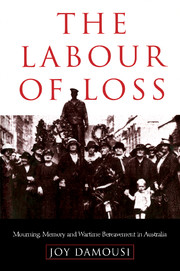Conclusion
Published online by Cambridge University Press: 06 July 2010
Summary
Judith Butler draws a connection between grief, its public acknowledgement, and political activism, arguing that if ‘the grief remains unspeakable, the rage over the loss can redouble by virtue of remaining unavowed’. She observes that ‘collective institutions for grieving are thus crucial to survival, to reassembling community, to rearticulating kinship, to reweaving sustaining relations’.
In this book I have explored the experience of loss in war where mothers, widows, fathers and limbless soldiers attempted to articulate a public language of grief to claim a legitimacy for their private loss. In mourning their loss, they attempted to sustain the memory of their sacrifice.This study suggests that this mourning process was a productive one, as grief became politicised. During the postwar years, mothers, fathers, widows and limbless soldiers channelled their grief through protest, as a way of redefining notions of sacrifice. They organised public meetings, formed associations, distributed newsletters, and lobbied politicians, demanding a privileged recognition of their grief and a revered place in public memory.
In the Australian context this process was given particular expression by the separation of the homefront and the battlefront. This brought mourners together in intimate ways, where their sense of loss and absence was shaped by the anticipation of bereavement. The bodies of Australian soldiers remained in Europe and they were buried there. For the bereaved, this encouraged an obsession with the details of death and with the grave site. Without the ritual of a funeral and a dead body, it was difficult for some to imagine that the soldier whom they had last seen alive was now deceased.
- Type
- Chapter
- Information
- The Labour of LossMourning, Memory and Wartime Bereavement in Australia, pp. 161 - 163Publisher: Cambridge University PressPrint publication year: 1999

